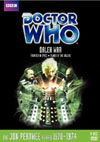Episode Three has just been restored to full colour for the DVD release, now matching the rest of the story!DVD Extras include:
The Structural Balance from Episode ThreeIt is an unfortunate tragedy that episode three of this six-part story could only be found in black and white for decades, but the story depends on remaining balanced between of scenes of action/suspense and scenes of quieter reflection, as a 1960's survey mentioned in Jeremy Bentham's "Doctor Who - The Early Years" says good television drama ought to. In attempts to syndicate a colour-only version for television, there have been both a five-episode version that completely ignores the BW episode 3, and the putrid movie-length compilation that totally destroys the story's balance, not only by leaving out the entire BW episode, but also by cutting many colour scenes from episodes two and four, most of these being Jon Pertwee's, and leaving nothing whatsoever of the "rise through the hot-air shaft" action sequence. In that version, we go from excessive quiet reflective scenes unnaturally packed together from the end of episode two, straight into another long set of quiet reflective scenes from the middle of episode four onwards, so if you weren't encouraged enough to fall asleep before, you certainly will be now. This also allows Vaber to whine continually, instead of giving us that nice long break without him. If that's the only version you've seen, and you care about Doctor Who, do yourself a favour. Get the video or DVD and watch it. It is a significant improvement.
Third IncarnationIncomplete versions aside, how bad is the original six-episode story? Is it really the worst of the Pertwee era?Well, for Terry Nation's writing, it seems to be even more a case of "take the money and run" than his first Dalek story from 1963. In fact, this IS his first Dalek story from 1963, thinly disguised and only slightly redressed, now in its third incarnation after the original TV version (story no. 2) and the Peter Cushing feature film. Nation even reminds the viewers of the previous adventure with Barbara, Ian and Susan through the Doctor's dialogue, making it even easier to draw the comparison: The TARDIS lands in the forest/jungle, and after some extra fiddling around inside it and some exploration outside, the Doctor becomes a captive in the Dalek city, which leads to an escape sequence involving a vertical shafts and door-cutting. Then we'll want to sit around the campfire with some Thals and exchange some philosophical tidbits, before being thrust into the final battle with the enemy. As with any Terry Nation script, episode one features a mysteriously mute loner tracking one of our protagonists, a loner who can't discover his power of speech until episode two, when he will become an important helping friend. This time around, the loner is Wester and he's invisible. Woo woo woo. The first Thals we see also have a ridiculously hard time finding their tongues as well, but at least they don't have to hold out for an entire episode. I don't know what the Thals think they've armed themselves with, but the guns tethered to their belts are totally useless. On the rare occasions when anyone tries to use one, they have no effect whatsoever and are instantly out of ammunition. This seems to be an artificial way of maintaining another Nation scripting rule: only Daleks are allowed to have working beam weapons; humanoid protagonists must fiddle around with clumsy bombs instead. Humanoids in Nation Doctor Who scripts are also not allowed to be seen landing their spacecraft; they must always crash them instead. The whole galaxy's at stake, and this is what's gonna save us? Pretty sad. The philosophical debate in the original 1963 TV show was one of its major strengths, a source of meaty drama helping to set it apart from the Cushing feature and most other Terry Nation Dalek stories. Philosophy is attempted here again, but is far more lame. From quiet chats between the Doctor and Codal, to the eternal debate between Taron and Vaber, a specific context is needed to pick a winning philosophy from any pair being debated, but Nation lets them clash as generalizations instead, making it kind of pointless to pick an overall winner, and sounding quite condescending when anyone does. Codal appears to be quite a weenie in the end, thanking the Doctor for closing his mind down to a few generalizations that won't always fit the situation at hand - at least Jon Pertwee's speechless Doctor appears quite surprised to have been taken so seriously, and perhaps is wondering if he should have said anything at all, if Codal is too impressionable. The one reasonable bit of philosophical advice is not to glorify war or make it exciting. Now if Nation were to follow that advice himself, he would have to stop writing good vs. evil Dalek stories! Catch-22!
Limp ProductionHaving said all of that, the script is typical Terry Nation as it weighs in on the thin side where dialogue is concerned, leaving it up to the director and the musician and the rest of the production crew to construct suspense and excitement and hold the viewers' attention through all the wordlessness. In other words, for once the script is not going to carry director David Maloney, and he will be tested to see what he's made of. Douglas Camfield managed to remain creative under this challenge during "The Dalek Masterplan" (story no. 21), but unfortunately David Maloney is at his least effective in "Planet of the Daleks". The narrative gets told adequately, but scene after scene barely gets by and very few have any magic in them. In many cases, the camera simply seems to have no love for the beauty of the Dalek shape moving through a well-composed frame.The Daleks themselves are particular let-downs once again, seeming more uncoordinated here than anywhere else in the series. The camera and the Dalek operators seem to have great difficulty figuring out which lines belong to which Dalek - sometimes they all flash their lights; sometimes none of them do, usually changing their minds in mid-sentence. Roy Skelton and Michael Wisher have plenty of long Dalek conversations between themselves alone, and manage to sound so identical to each other that this hampers the problem even more and makes such conversations hard to follow, but at least none of the Daleks sound like frail old grannies this time around. Having only blue Daleks in the first five episodes also keeps things visually confusing - a red or black section leader would help enormously with the visual literacy of the piece and make good story sense. Just when the three regular operators seem to have gained control of their blue Daleks, a very cool gold Dalek makes a grand entrance, and new operator Tony Starr goes through the same under-rehearsed on-screen learning curve of stealing other Daleks' lines and looking quite clumsy in the machine. Personally, I think the new black & gold Dalek unique to this one episode is a totally cool costume/prop all except for one thing: the damn flashlight he has for an eyestalk blinking while he speaks. Come on; he's supposed to SEE out of that thing! The poor High Councillor must be nearly blind by now. And it is so obviously a flashlight, that one can see where a certain bad reputation for all Daleks began! Topping it off for a poor Dalek showing is the pathetically outdated full-frame negative image being the only visual effect used to show their beam weapon fire. It doesn't look too bad on the black and white episode, perhaps due in large part to the gyrations of the actor "dying" on screen, but it doesn't cut the mustard in colour. And of course it's hard to believe that only the Doctor's legs were hit and paralysed when the effect surrounds all of him and most of the nearby jungle as well. Dudley Simpson also doesn't seem to have been much help in constructing the mood for the numerous wordless scenes. His music is exceedingly average, backseat filler; none of it really reaches out to make an emotional impression. The closest that this adventure comes to having a musical theme is a rather dull and subdued marching beat that first plays as a Dalek escorts the Doctor down the elevator to his cell, music which doesn't air again at all in the mutilated Lionheart compilation version. Thanks to a bit of clumsiness in the studio, the Dalek looks sideways while moving forward and supposedly guarding the Doctor in front of him. It's so ridiculous, Maloney should have called for a reshoot, and perhaps asked Pertwee to look a little less bored.
Pace, Interest, and EnergyI find the first two episodes to be rather slow and dull, particularly where we are blandly going through old established Nation formulas. The Doctor does his "Man of Sleep" routine again, and Jo is less than effective at making exploration work all on her own. It is interesting how easy it is to compress the footage into a shorter time and make it all work much better. Since nothing happens visually whenever Jo talks into the log, and nothing audible is key to understanding the story when she wanders around doing something, her log entries can play on the soundtrack while she does something or while we see the things she notices, and the pace is far improved without the doubled scenes. This is no secret formula; Star Trek has been doing it for decades, and Star Trek's producers say they came up with "The Captain's log" as a device to keep the pace up! If you're going to copy it, do it right. Terrance Dicks seems to have added it to Nation's script as filler instead to slow the pace down.Also, after the overdose of the prisoner dynamic in the last story, this story does not get off to too great a start by making a prisoner of the Doctor yet again as soon as he meets the Daleks. Maloney loses marks for visual literacy in episode two, as our first encounter with the fascinatingly engraved set for the entrance to the Dalek city should occur as the Daleks lead the Doctor through as their prisoner. This would be far more interesting than all those long scenes of blank white corridor walls that we do get, and help us forget the prisoner dynamic in place of more spirit of exploration and adventure. Out-of-order studio recording should make it easy enough to achieve. This is exactly the same fault that occurs with the entrance to the lair in episode two of "The Three Doctors" (story no. 65). Both stories' directors should be made to stand in the corner for five minutes for this booboo. Things pick up by episode three, thanks in large part to the action sequences which Maloney seems to be fairly good at, and also the fact that the long stretch of the prisoner dynamic is at last broken for good. Perhaps I'm additionally biased towards this material as it's relatively new to me, but so be it. The air shaft sequence also seems to be creatively realised considering the limitations of the studio. And the lighter scenes following are far more palatable after the mayhem of all that action. In terms of acting performances, Bernard Horsfall as Taron is the only one that stands out well. Even when many of his lines seem foolish, Horsfall remains solid and his presence encourages one to take the production, such as it is, a little more seriously and make the story a little more believable too. It's easy to see why Maloney likes to cast him. Prentis Hancock always seems to land argumentative roles on both Doctor Who and on Space: 1999. Either that, or he's got a talent for bringing the argumentative nature out of a character and going over the top with it. His character of Vaber is not really a good idea for the script, because although he's got a really good point to his main complaint, it highlights for the audience the fact that the good guys are not going to be allowed to accomplish anything until their six episodes are up and they can finally win. Hancock seems to be capable of better stuff when not stuck in this typecast, as he proved in his small reporter's role in "Spearhead From Space" (story no. 51), and it would be nice to see him in other roles like that. I think he also did really well in "The Ribos Operation" (story no. 98).
Wrapping UpEpisode Five ends on a nice sudden "how-are-they-going-to-get-out-of-this-one" cliffhanger, while allowing the memory of a rather horrific conundrum and an eerie image linger a bit longer in the minds of the audience. Episode Six then gives us non-stop action, which leaves a lot to be desired in terms of effects and realistic suspense, but is still a far better ending than what "Frontier in Space" gave us.Maloney has done police box visual effects on the cheap throughout this story and in the reconstructed ending for the previous one, but at least we get plenty of the TARDIS interior. Savour it while it lasts, because it will only appear in one other story during the next two and a half years. In the end I think the original six episodes are good enough to rival "Frontier in Space" story no. 67, with this being a better developed script of a far weaker-themed story idea. (After all, it had been in development since 1963 - a good ten years previous). An upset in the rankings is not too far-fetched after all. But unlike the previous story, the flavour of padding here does little to create anticipation of good stuff to come; in fact the Taron/Vaber arguments go far to create a prediction of the exact opposite. "Planet of the Daleks" still deserves the Wooden Turkey Award for worst season ten story.
This story is available on DVD (bundled with the previous story) and VHS video. Click on the Amazon symbol for the location nearest you for pricing and availability:
Comments on this article are welcome. You may contact the author from this page:
|









